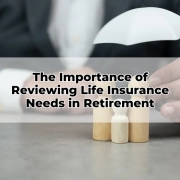The Role of Term Life vs Whole Life in Estate Planning
Table of Contents
ToggleEstate planning is a crucial aspect of financial management, ensuring that assets are efficiently transferred to beneficiaries while minimising taxation and legal complications. Among the tools used in estate planning, life insurance plays a pivotal role. Two primary forms of life insurance—term life and whole life—offer distinct benefits and considerations. Choosing the right policy can significantly impact an estate’s value, liquidity, and the financial security of heirs.
What Is Term Life Insurance?
Term life insurance provides coverage for a specified period, such as 10, 20, or 30 years. If the policyholder passes away within this period, beneficiaries receive a death benefit. However, if the term expires and the policy is not renewed, no payout occurs. This type of insurance is generally more affordable and serves a specific financial purpose, often used for income replacement or debt protection.
What Is Whole Life Insurance?
Whole life insurance, a form of permanent insurance, remains active for the policyholder’s lifetime as long as premiums are paid. Unlike term life, whole life policies accumulate a cash value component, which can be accessed during the insured’s lifetime. This feature makes it a powerful tool in estate planning, offering liquidity and long-term financial security.
Cost Differences: Term vs Whole Life
Term life insurance is significantly more affordable than whole life insurance, as it only provides a death benefit for a set period. Whole life policies, while more expensive, offer lifelong coverage and a cash accumulation feature. The cost differential often leads individuals to choose term life for affordability and whole life for estate preservation.
Liquidity Considerations in Estate Planning
Liquidity is a key concern in estate planning, as heirs may need immediate access to funds to cover taxes, debts, or other obligations. Whole life insurance provides a guaranteed payout upon death, ensuring liquidity. In contrast, term life insurance may expire before the policyholder’s death, potentially leaving the estate without necessary liquidity.
Tax Implications of Life Insurance in Estate Planning
Life insurance death benefits are typically tax-free for beneficiaries. However, whole life policies offer additional tax advantages, such as tax-deferred growth of the cash value component and potential tax-free withdrawals. Proper structuring of policies within an estate plan can minimise estate taxes and maximise wealth preservation.
Using Term Life for Specific Financial Goals
Term life insurance is often used to cover specific financial obligations, such as mortgage payments, educational expenses, or business loans. Its affordability allows individuals to secure high coverage amounts for a defined period, ensuring dependents are financially protected in case of untimely death.
Whole Life as a Wealth Transfer Strategy
Whole life insurance is a strategic tool for wealth transfer, providing a guaranteed inheritance to beneficiaries. Since the death benefit is not subject to market fluctuations, it offers financial certainty. High-net-worth individuals often use whole life policies within trusts to optimise tax efficiency and ensure a smooth transfer of wealth.
Flexibility and Access to Cash Value
Whole life insurance policies allow policyholders to borrow against the cash value or withdraw funds if necessary. This feature provides financial flexibility, enabling individuals to fund retirement, invest in opportunities, or manage unexpected expenses. Term life, in contrast, does not offer this benefit.
The Role of Insurance in Business Succession Planning
Business owners can use life insurance to ensure continuity in succession planning. A whole life policy can fund buy-sell agreements or provide liquidity for estate equalisation among heirs. Term life may be suitable for covering temporary business obligations but lacks the long-term benefits of whole life insurance.
Choosing the Right Policy Based on Individual Needs
The decision between term and whole life insurance depends on financial goals, risk tolerance, and estate planning objectives. Those seeking affordable coverage for a fixed period may prefer term life, while individuals focused on legacy planning and tax-efficient wealth transfer often choose whole life.
Integrating Life Insurance with a Comprehensive Estate Plan
A robust estate plan incorporates various financial instruments, including wills, trusts, and life insurance. Working with a Toowoomba Financial Adviser ensures policies are structured optimally to meet long-term financial objectives. Regular reviews of life insurance policies help maintain alignment with evolving estate planning goals.
Conclusion
Estate planning is a critical process that requires careful consideration of life insurance options. Both term and whole life insurance serve distinct roles in ensuring financial security for loved ones. Consulting with a Financial Planning Toowoomba expert can help individuals make informed decisions that protect their legacy and provide long-term peace of mind.









